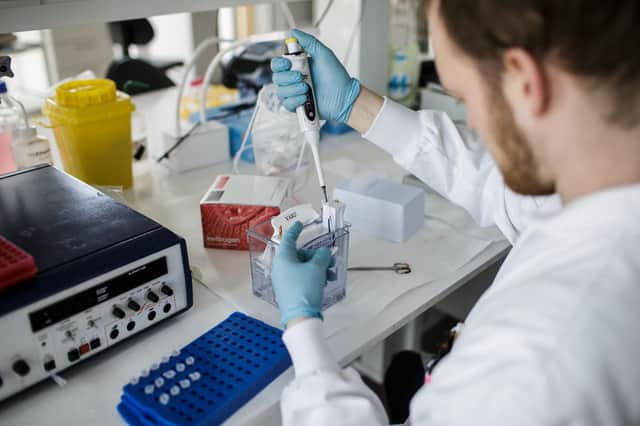Covid's enforced changes to education can spark a new Scottish enlightenment – Professor Joe Goldblatt


During this time, I was a doctoral student and after my evening class had concluded I shared drinks with fellow students and then my right eye noticed the bright lights still burning in the Gelman Library on the campus of George Washington University in Washington, DC.
There I marvelled at the determination and passion for learning being exhibited by dozens of students who were still studying late into the night for their degrees.
Advertisement
Hide AdAdvertisement
Hide AdUpon earning my doctoral degree, I began teaching and leading a large continuing professional development programme at this same university. One morning at 7am, I was at my desk preparing for the day’s classes when I heard a knock on the front door.
I looked through the glass to find a middle-aged woman and when I cautiously opened the door, she asked: “May I come in?” She went on to explain that this was the only time she could use our computer laboratory to improve her skills while her husband watched their young children and before they started their employment.
Commitment and a passion for learning are the two essential chemical agents that when mixed in the petri dish of higher education will result in an explosion of new growth, opportunity and future success. For 47 years, I had a front row seat to observe the growth and development of higher education in both the United States and Scotland.
And then it all went pear-shaped. In 2020, without warning, the global pandemic hit and quickly resulted in the reimagining and reinventing of higher education throughout the world.
Whilst many other sectors began wringing their hands with anxiety about their future, I was delighted to see that the leaders of Scottish further and higher education chose instead to roll up their sleeves and find new ways to better promote teaching and learning.
However, despite their best efforts in a time of great uncertainty and fear, they may have often wondered, “What do we do next?”
Here are three areas that deserve further consideration.
Firstly, Scotland’s further and higher education leaders have come to recognise that the introduction of more technology in teaching will result in wider participation and deeper learning opportunities for students throughout the world. The concept of being able to learn anywhere and anytime will be further embraced by students, especially those who continue to work whilst educating themselves for new post-pandemic careers.
Secondly, the role of universities and colleges has always embraced theoretical, practical and social learning to endeavour to help develop better informed and skilled citizens. In the 1950s, President Harry Truman commissioned a study of higher education in the United States and this resulted in the development of further education colleges as both a destination for learning a skill, as well as a gateway for additional study at universities. The link between further and higher education must be solidified.
Advertisement
Hide AdAdvertisement
Hide AdThirdly and finally, another finding of the Truman study was of the importance of colleges and universities in providing further social development for their students. When the first universities were established in the United States, the social element of clubs, societies, volunteer activities and other ways to link theory with practice was a key part of the overall structure of the university community.
Queen Margaret University in Edinburgh has proven how important this social engagement is for students. In 2020, all universities in Scotland were forced to cancel their graduation ceremonies.
However, in 2021, the principal of Queen Margaret University, Sir Paul Grice, recognised the need for his students to return to their campus and celebrate their achievements within a safe Covid-compliant environment.
He and his colleagues devoted three full days of on-campus outdoor graduation celebrations to their Class of 2020 – the students who missed out on their graduation ceremony last year – and the graduating class of 2021.
This allowed graduates to have their moment – to wear that all important graduation robe, have their professional graduation photos taken and raise a glass with academics, fellow students and loved ones – and indeed it was a fitting conclusion to their years of hard work.
The word university implies that a universe of ideas is awaiting discovery and development by the explorers who, similar to those I first witnessed at George Washington University, dare to dream of a better life for themselves and all of human society.
Therefore, I am absolutely certain that Scotland’s leaders in further and higher education will now create the explosion of a new Scottish enlightenment that will be even more exciting and sustainable than that which was experienced in previous eras.
In order for human society to mitigate or manage future pandemics, we must put our faith in the scholars of today and tomorrow to provide the foundations needed to produce the future citizen leaders who shall be even better prepared than previous generations.
Advertisement
Hide AdAdvertisement
Hide AdEnhanced technology, greater access to learning for all and improved social engagement will allow us to marvel, as I did many years ago, at how far we may travel as a society.
Joe Goldblatt is emeritus professor of planned events at Queen Margaret University in Edinburgh, Scotland. He was a tutor, lecturer and professor for 47 years prior to his retirement. To learn more about his views visit www.joegoldblatt.scot
A message from the Editor:
Thank you for reading this article. We're more reliant on your support than ever as the shift in consumer habits brought about by coronavirus impacts our advertisers.
If you haven't already, please consider supporting our trusted, fact-checked journalism by taking out a digital subscription.
Comments
Want to join the conversation? Please or to comment on this article.
